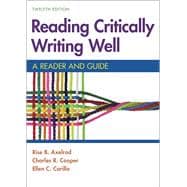
Reading Critically, Writing Well
- ISBN13: 9781319194475
- ISBN10: 1319194478
- Additional ISBN(s): 9781319032753, 9781319332297, 9781457638947
- Edition: 12th
- Format: Paperback
- Copyright: 2019-10-03
- Publisher: Bedford/St. Martin's
- View Upgraded Edition
Note: Supplemental materials are not guaranteed with Rental or Used book purchases.
-
Your order must be $35 or more to qualify for free economy shipping. Bulk sales, PO's, Marketplace items, eBooks and apparel do not qualify for this offer.








